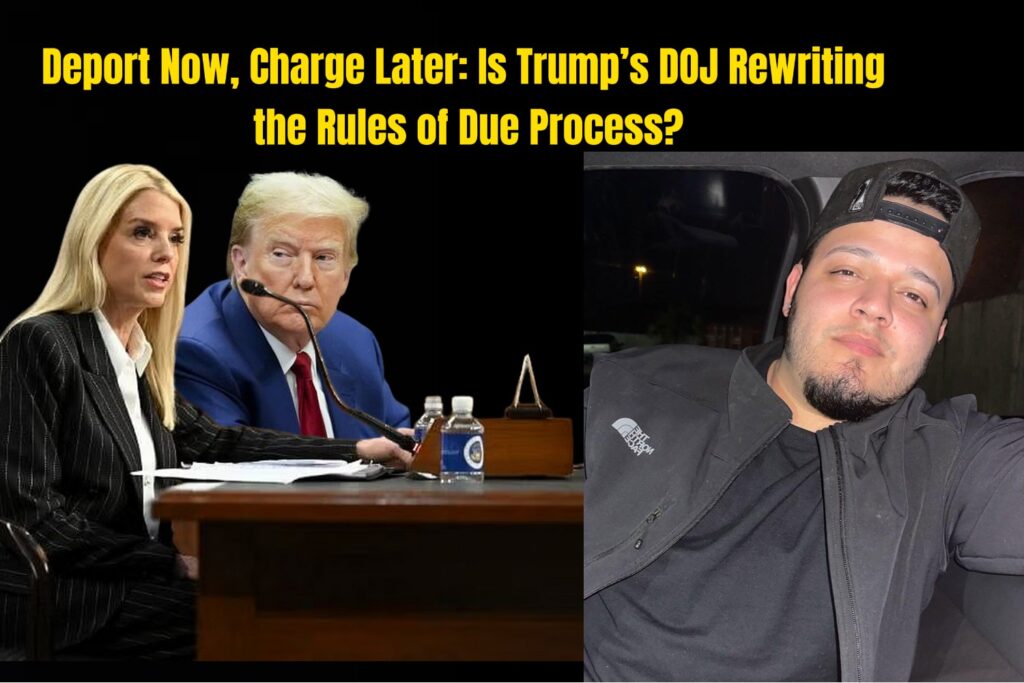Kilmar Abrego Garcia’s return to the United States this week has reignited fierce legal and political debate, as the Trump administration‘s Department of Justice faces accusations of using criminal charges to sanitize what critics call an illegal deportation. Abrego, a longtime Maryland resident and Salvadoran national, was deported earlier this year in defiance of a federal court order—only to be swiftly re-indicted upon his forced return.
The DOJ has charged Abrego with human smuggling-related offenses, but critics, including a federal prosecutor who resigned in protest, allege the timing is politically motivated. Many argue that the charges serve as a retroactive cover-up for what was a potentially unlawful and embarrassing act by the government.
Deportation in Defiance: The Original Embarrassment
In March 2025, Kilmar Abrego Garcia was deported to El Salvador’s controversial CECOT mega-prison despite a 2019 federal court injunction protecting him from removal. The court had determined that he faced credible threats to his life due to gang violence in El Salvador. Nonetheless, U.S. Immigration and Customs Enforcement (ICE), backed by the Trump-aligned DOJ, proceeded with the deportation.
The administration defended the move by labeling Abrego as a “known MS-13 affiliate”—a claim his legal team and family categorically denied. Multiple legal and human rights organizations decried the deportation as a flagrant violation of judicial authority. Even internal memos leaked to the press revealed that some immigration officials acknowledged the removal was an “administrative error” or worse, an intentional defiance of federal court authority.
Charges Filed Against Kilmar Abrego Garcia: Justice or Justification?
Following intense legal pressure and a Supreme Court ruling in May 2025, Abrego was returned to U.S. soil and arraigned in a Tennessee federal court. He now faces a two-count indictment: conspiracy to transport undocumented immigrants for financial gain and unlawful transportation of noncitizens across state lines.
According to the indictment, Kilmar Abrego Garcia allegedly participated in a cross-border smuggling operation between 2016 and 2023, facilitating the movement of thousands of migrants through Mexico into the United States. Prosecutors claim he profited from these activities, sometimes placing women and children in perilous conditions. Yet notably, none of the charges include gang-related violence or organized crime affiliations, undermining the administration’s original justification for his removal.
OGMNews.Com
Evidence Under Scrutiny Against Kilmar Abrego Garcia: A Case Built on Convenience?
Indicted to Distract? Trump DOJ Accused of Using Charges to Mask Illegal Deportation

Despite the gravity of the accusations, critics have raised significant doubts about the evidence. The DOJ has cited phone records, wiretaps, and alleged financial transactions as proof of Kilmar Abrego Garcia’s involvement in smuggling operations. However, no physical evidence or testimony has been made public linking him to specific criminal acts or gang leadership.
Moreover, one particularly inflammatory allegation—claiming Abrego orchestrated retaliation against a rival gang member’s family in El Salvador—was not included in the indictment. Critics say this tactic is designed to sway public perception without bearing the burden of legal proof. His legal team argues the charges were held in reserve and unsealed only after the DOJ faced backlash for violating federal law during the deportation process.
Political Fallout: Resignations and Hearings Ahead
The fallout has not been confined to courtrooms. A senior federal prosecutor in Tennessee resigned last week, citing the Abrego case as the “final straw” in what she called “a DOJ more concerned with optics than law.” Civil rights groups and members of Congress have echoed similar concerns, suggesting that the charges were filed not in pursuit of justice, but to reframe the administration’s missteps.
Several lawmakers have called for formal hearings into the DOJ’s conduct, particularly its willingness to defy court rulings and use sealed indictments for political cover. As one Democratic senator remarked, “This is not law enforcement—it’s narrative engineering with legal tools.”
Attorney General Speaks: Sentencing and Sentiment
Attorney General Pam Bondi, in a brief statement, defended the charges, saying, “If convicted, Mr. Kilmar Abrego Garcia will serve his sentence here and be removed lawfully.” She confirmed that prosecutors will seek pre-trial detention due to the defendant being considered a flight risk and a community danger. His arraignment is set for June 13, where the defense plans to argue for dismissal or, at minimum, pre-trial release.
Bondi dismissed criticisms of political motivation, stating that “the DOJ remains committed to law and order, not political appeasement.” But her comments have done little to quell the rising tide of concern over what appears to be a reactive prosecution rather than a proactive pursuit of justice.
Critics Weigh In: Justice or Judicial Laundering?
Legal experts and civil rights attorneys have characterized the case as a prime example of “judicial laundering”—using the courts to cleanse unlawful actions retroactively. “This isn’t just about Kilmar Abrego Garcia,” said constitutional scholar Dr. Lena Huerta. “It’s about whether an administration can violate the law and then weaponize the legal system to escape accountability.”
Some commentators have likened the saga to political theater. One editorial in The Guardian opined: “This is a cover-up masquerading as a case file.” Meanwhile, supporters of the administration argue that criminal charges, regardless of timing, must be taken seriously and fully investigated.
Kilmar Abrego Garcia Vs DOJ: A Legal Storm with Political Clouds
As the Kilmar Abrego Garcia case unfolds, it highlights a dangerous intersection between immigration enforcement, judicial defiance, and political expediency. While the charges may be grounded in legitimate concerns over human trafficking, the context and chronology raise uncomfortable questions about the integrity of the process.
If the DOJ hoped to close the chapter on its legally dubious deportation by filing charges, it may have only opened a new one—marked not by resolution, but by reckoning. For now, the real trial may not be in the courtroom, but in the court of public accountability.














